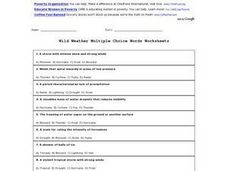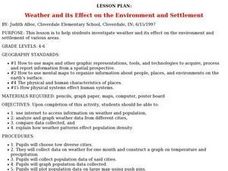Curated OER
Moon Observations
Third graders create a model of the moon and use a flashlight to illustrate the various stages of the moon.
Curated OER
Map Reading in the 21st Century
Students interact with MapPoint tools to view maps of the past and the present in multiple ways. They participate in mini-lessons aimed at locating certain points of interest or famous routes taken in history.
Curated OER
From Lake to Tap
Students use the Internet to study how water is treated to make it safe to drink. They use a tutorial on the U.S. Environmental Protection Agency's website to gain this information. They complete a worksheet for the assessment portion...
Curated OER
Fossil Impressions of Ancient Life
Students make a mold using Plaster of Paris and then make a cast using that same mold. They pick a fossil and describe how it looks. They write a fictionalized story about its life, or burial. (
Curated OER
Plant Cells and Tissues
In this plants worksheet, students review 17 vocabulary words associated with the different types of plant cells and tissues. This worksheet has 17 matching questions.
Curated OER
Milkweed Monitoring
Ninth graders study milkweed and see how it is effected by ozone. In this air pollution lesson students complete a lab activity that includes data analysis.
Curated OER
Wild Weather Blackout Worksheet
In this weather worksheet, students read the definition and write the weather word that goes with it. Students write 15 weather words.
Curated OER
Wild Weather Vocabulary Decoder Worksheet
In this weather vocabulary activity, students match the letters next to the word to the number that represents its definition. Students complete this for 15 words.
Curated OER
Wild Weather Vocabulary Maze
In this weather worksheet, learners solve the clues at the bottom for vocabulary words they find in a maze. Students solve clues and look for 15 words.
Curated OER
Wild Weather Multiple Choice Words
In this weather words learning exercise, students complete a set of 15 multiple choice questions, reading descriptions of weather conditions and choosing the correct word for each description.
Curated OER
E3 Ret Lesson Plan
Students explore friction. In this physics lesson plan, students will cover metal blocks with film to determine the changes caused by static and kinetic friction.
Curated OER
"Arsenic and Old Waste": Groundwater Activities Using Modeling
Learners develop models of groundwater and pollution flow. They research information using the Internet and develop models of groundwater flow in Stella and Excel.
Curated OER
The Archaeology of Cactus Ruin
Students simulate archaeologists by excavating a paper site. In groups, they use a sampling strategy to determine information about the people who lived at the site.
Curated OER
The Shadow Knows
Sixth graders examine the relationship between light and the angle it strikes objects. In groups, they shine light from a flashlight on different objects and describe how it affects the shadow. To end the lesson plan, they complete a...
Curated OER
Nobody's Home
Students participate in a simulation activity that examines the economic impact of the construction of a reservoir-both the positive and negative side.
Curated OER
Handbuilding With Joan
Students discover the three basic handbuilding techniques used in beginning pottery: pinch pot, coiling, and slab work. After a lecture/demo, students try their hands at making pottery using the three different techniques.
Curated OER
Creating Space
Learners use simple lines and shapes to draw objects, figures, or animals.They explore the process of printmaking and making multiples, use repetition of simple shapes to create complex images, and inquire about a contemporary artist's...
Curated OER
Weather and its Effect on the Environment and Settlement
Students, after choosing two diverse cities, collect data on weather for a month and construct a graph on temperature and precipitation. After collecting population data of said cities, and graphing it, they plot population on a large...
Curated OER
United Kingdom
Middle schoolers investigate the geographical features of the United Kingdom. They create a clay, playdoh, or salt and flour map of the region. The maps should be labeled with landmarks and bodies of water. They can also draw maps on...
Curated OER
Tessellation Quilt Squares
Fifth graders design a "quilt block" that has a tessellating pattern to help create a class tessellation quilt. They describe relationships between two- and three-dimensional shapes and analyze attributes and properties of geometric...
Curated OER
The Politics of Water
Students investigate the Governor's Kansas Water Initiative. Students study rivers, cities and reservoirs and how their location effects the importance of their water quality issues.
Curated OER
Exploration and Settlement of the American Southwest
Students scrutinize the Zuni Pueblo Revolt in this seven lessons unit on early Spanish explorers in the American southwest. The discovery of the Spanish missions, the search for the seven cities of gold, and particular geological...
Curated OER
Rapping Regions in America
Students determine what designates a place as a region. They apply their criteria for a region to the US map. They work in groups to write a rap about their region that describes its organization, type and structure.

























